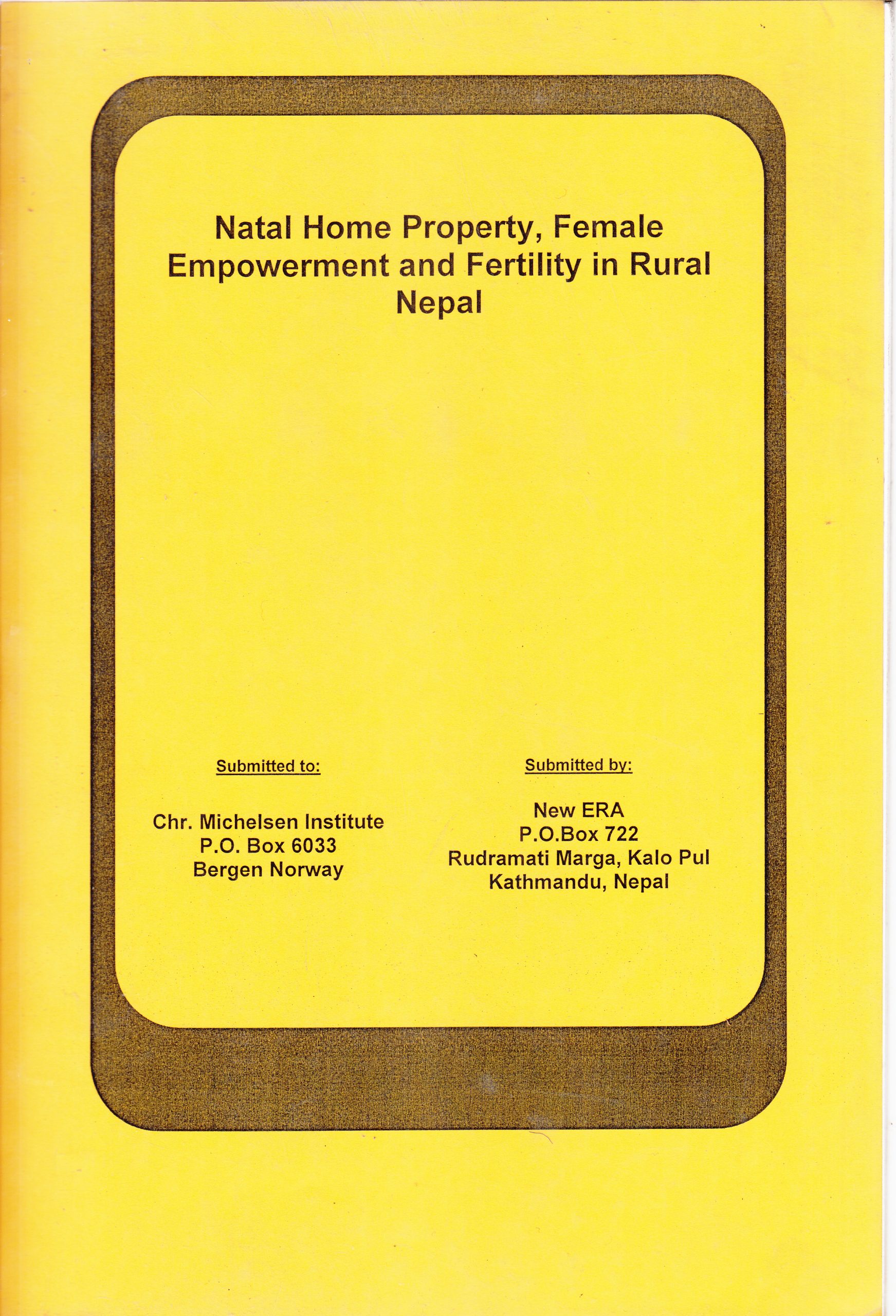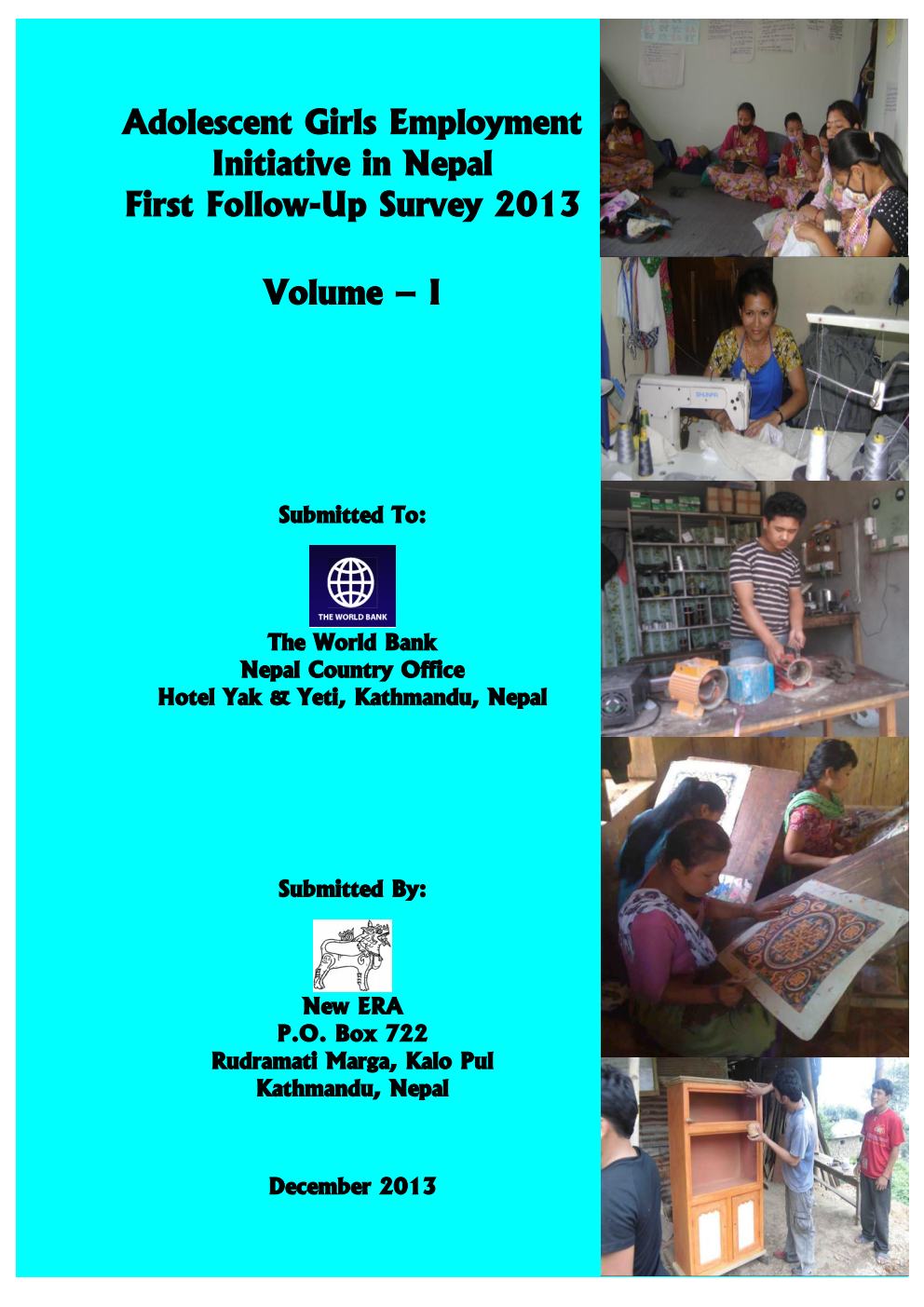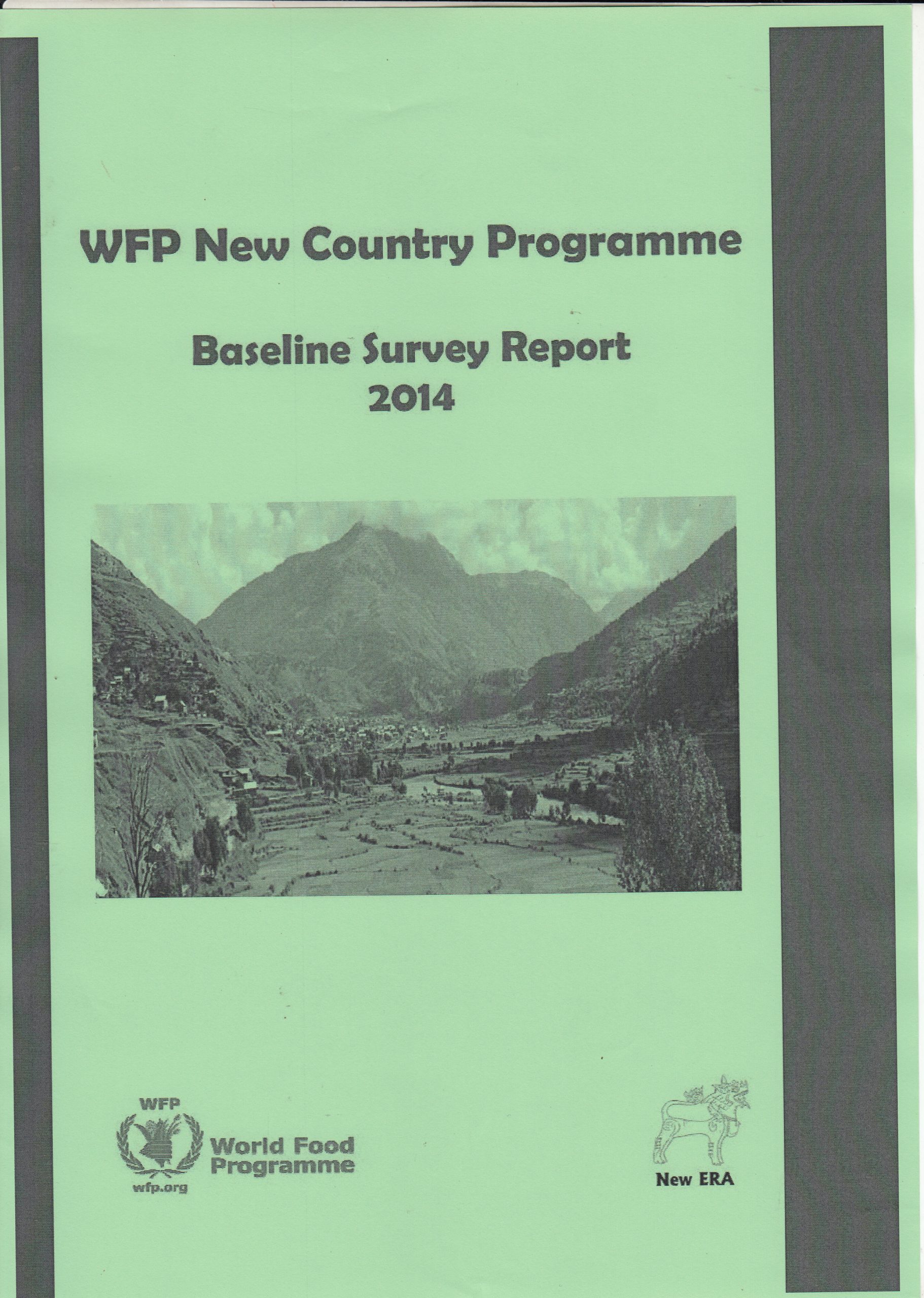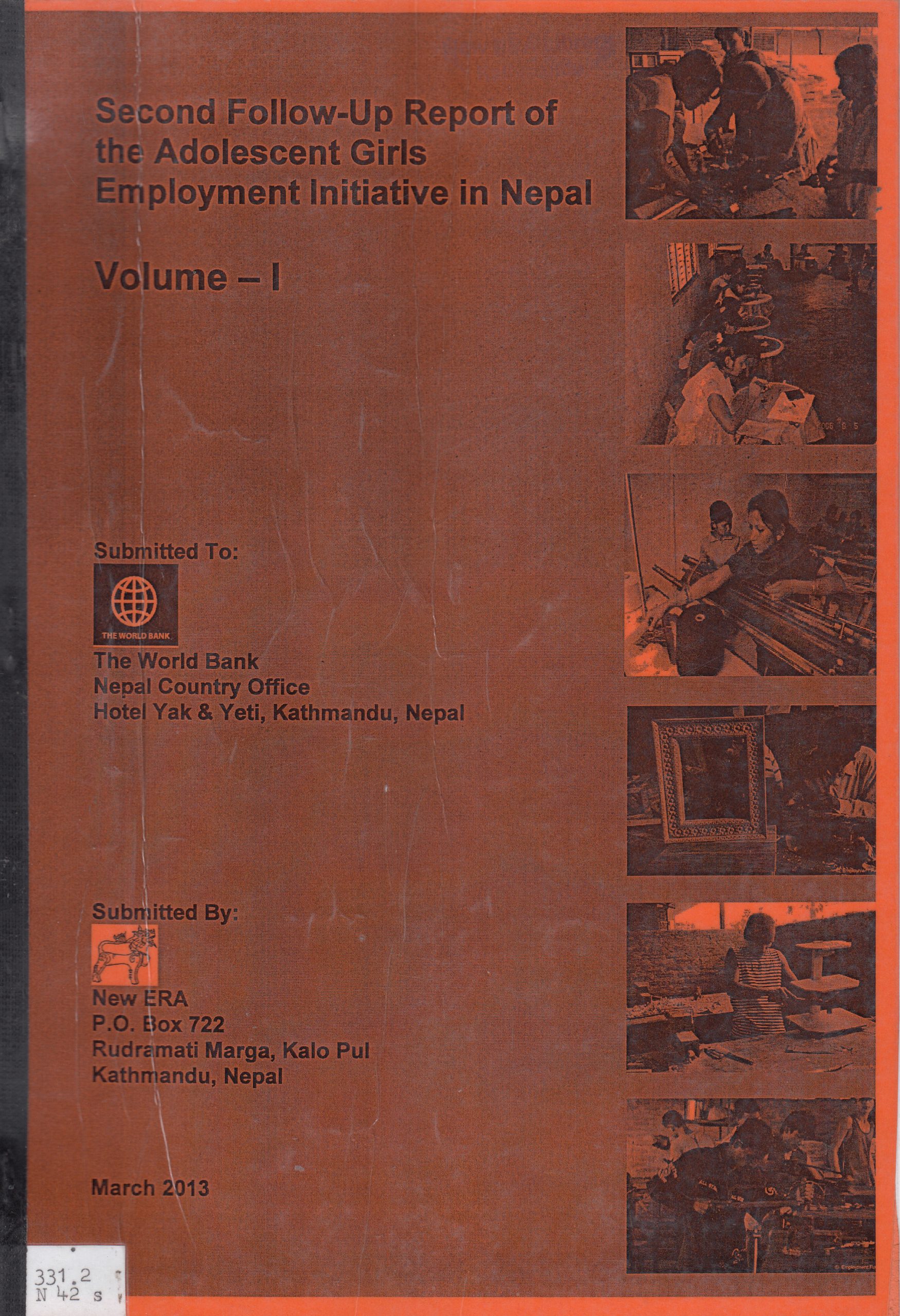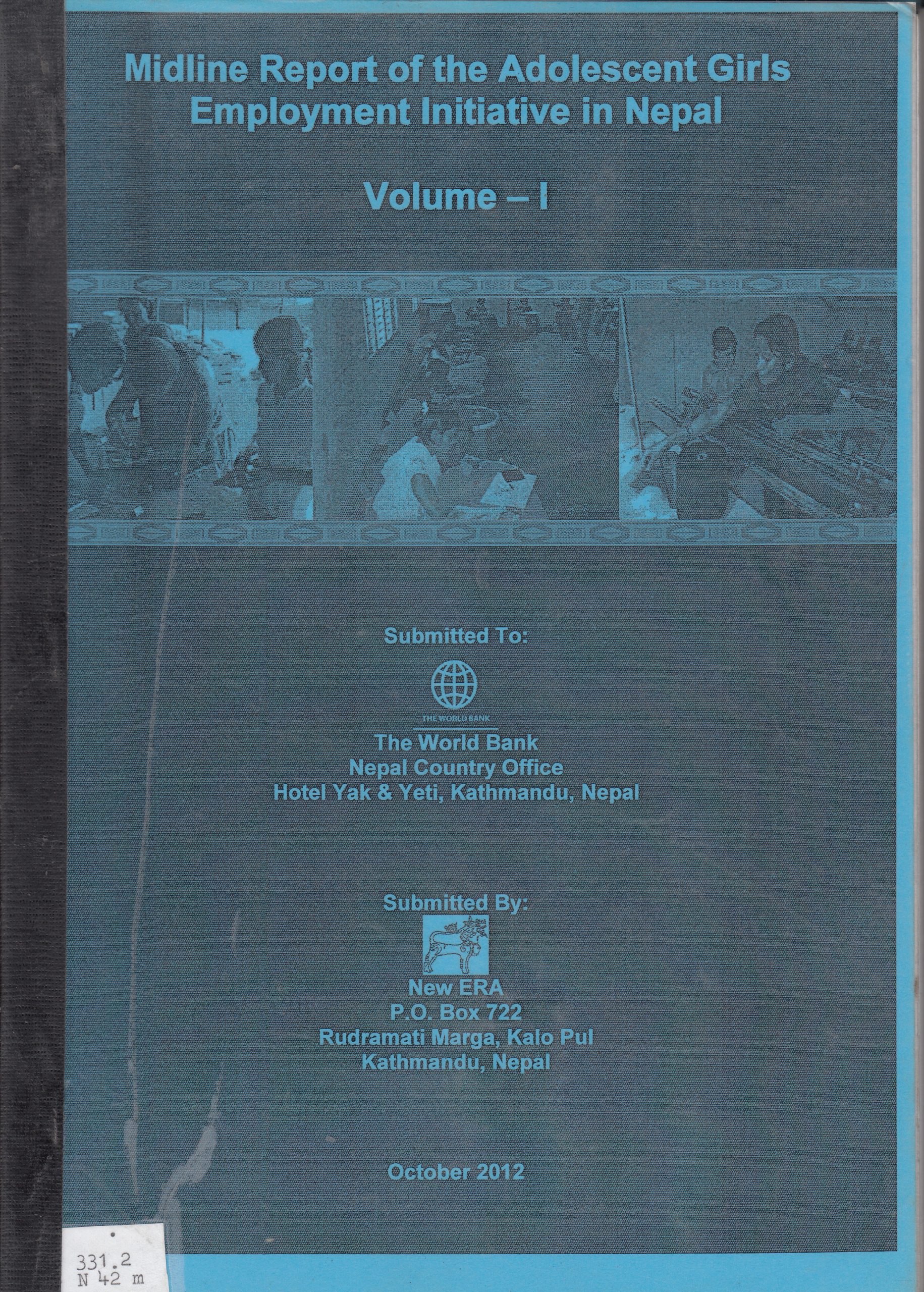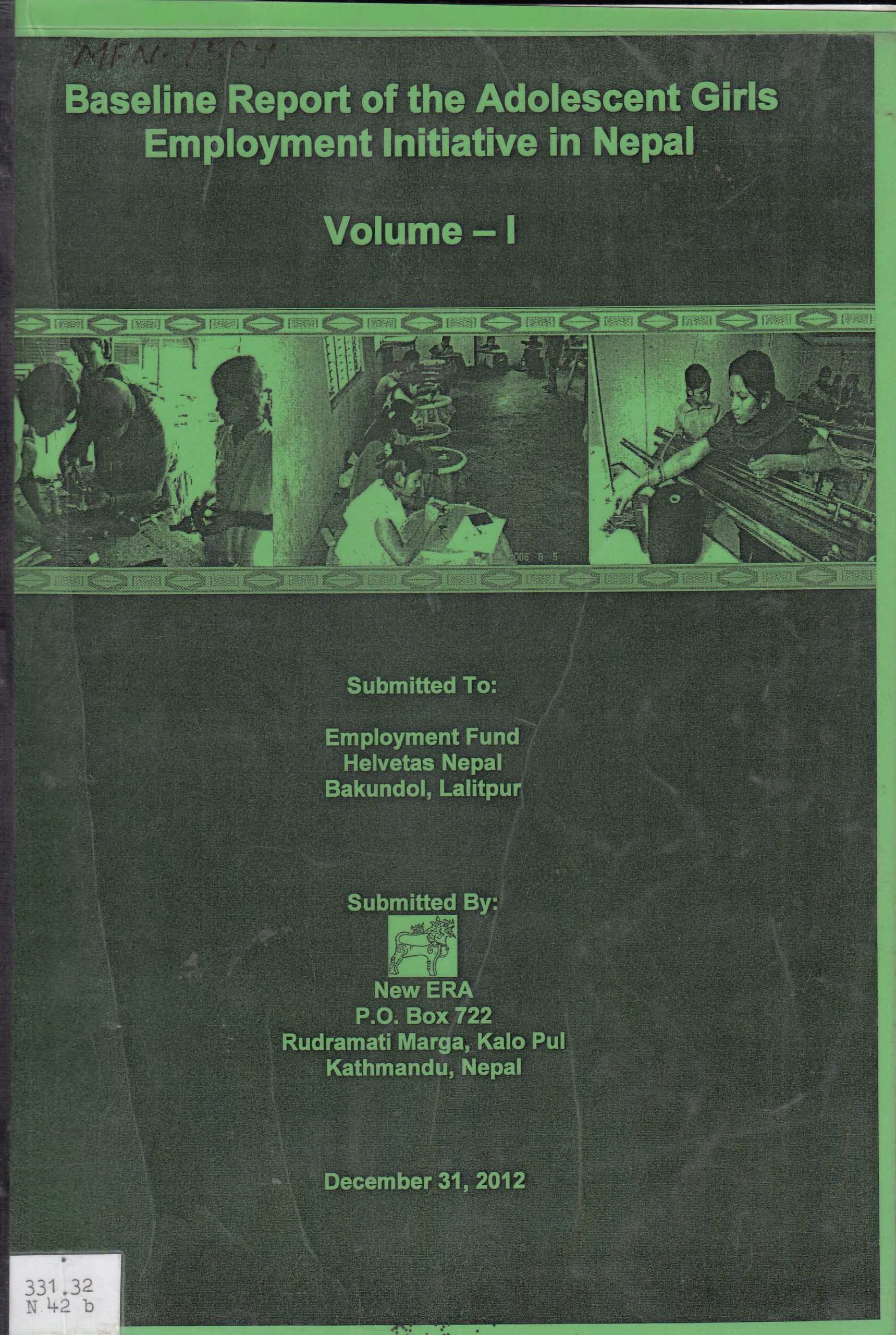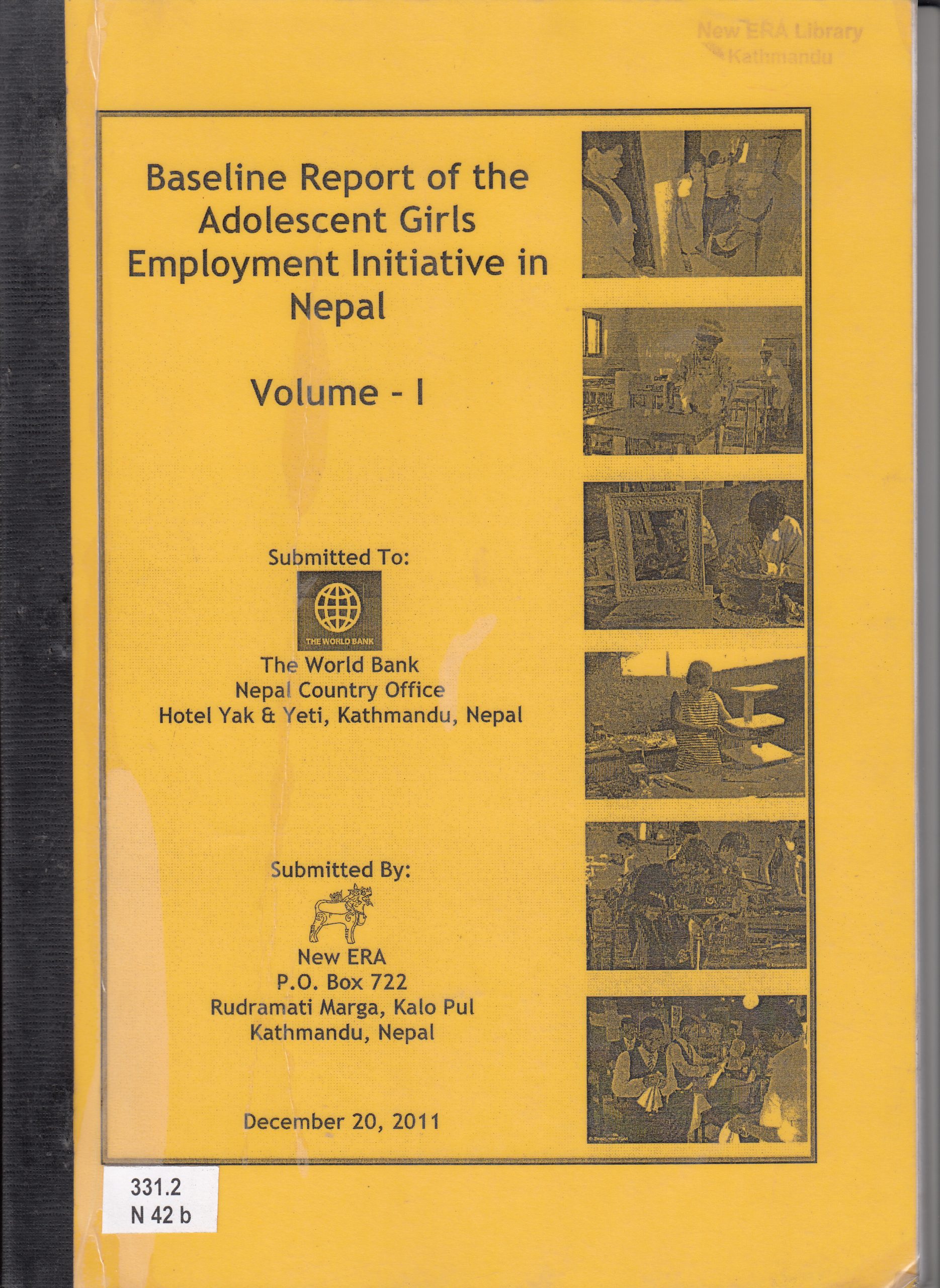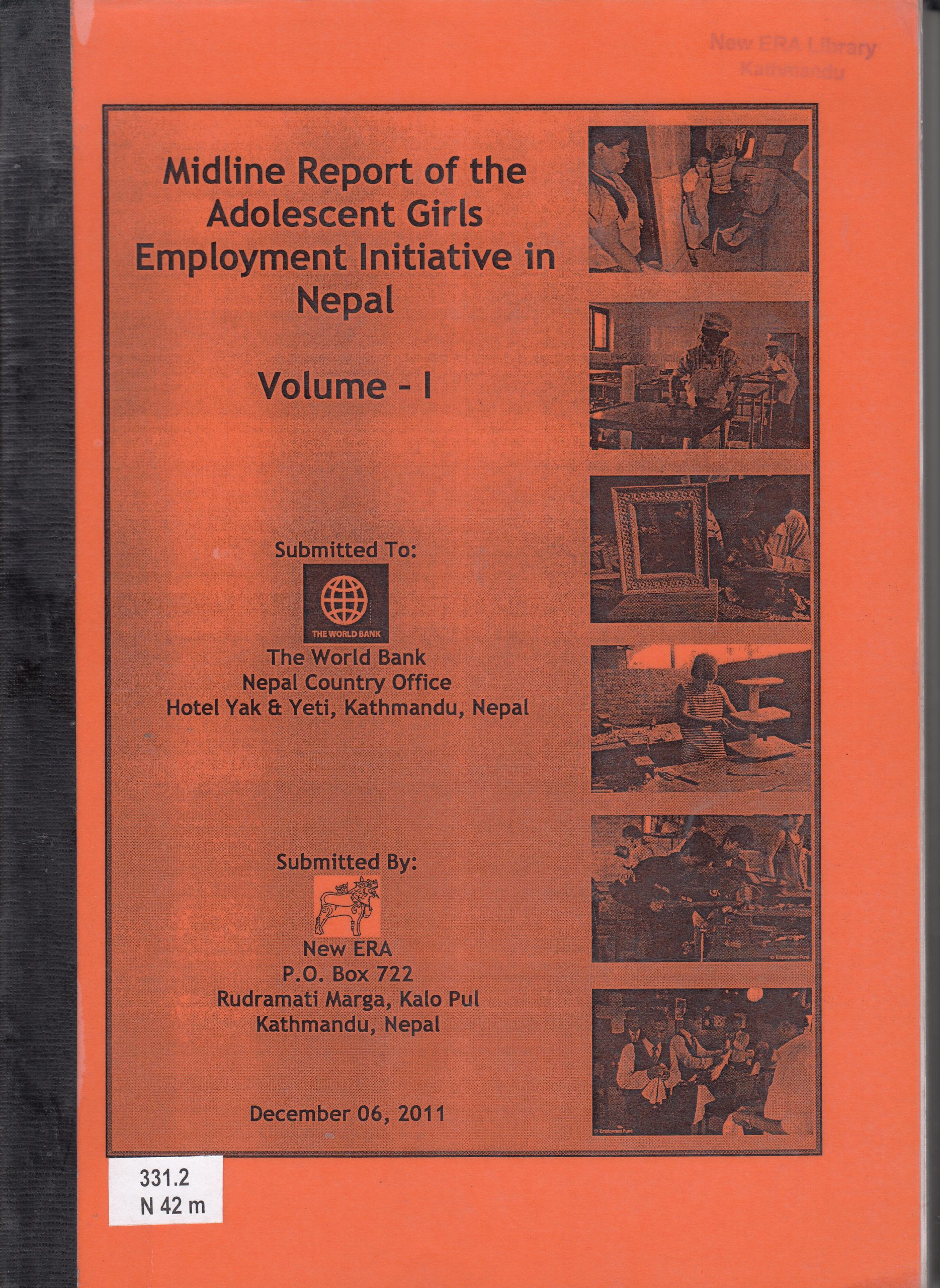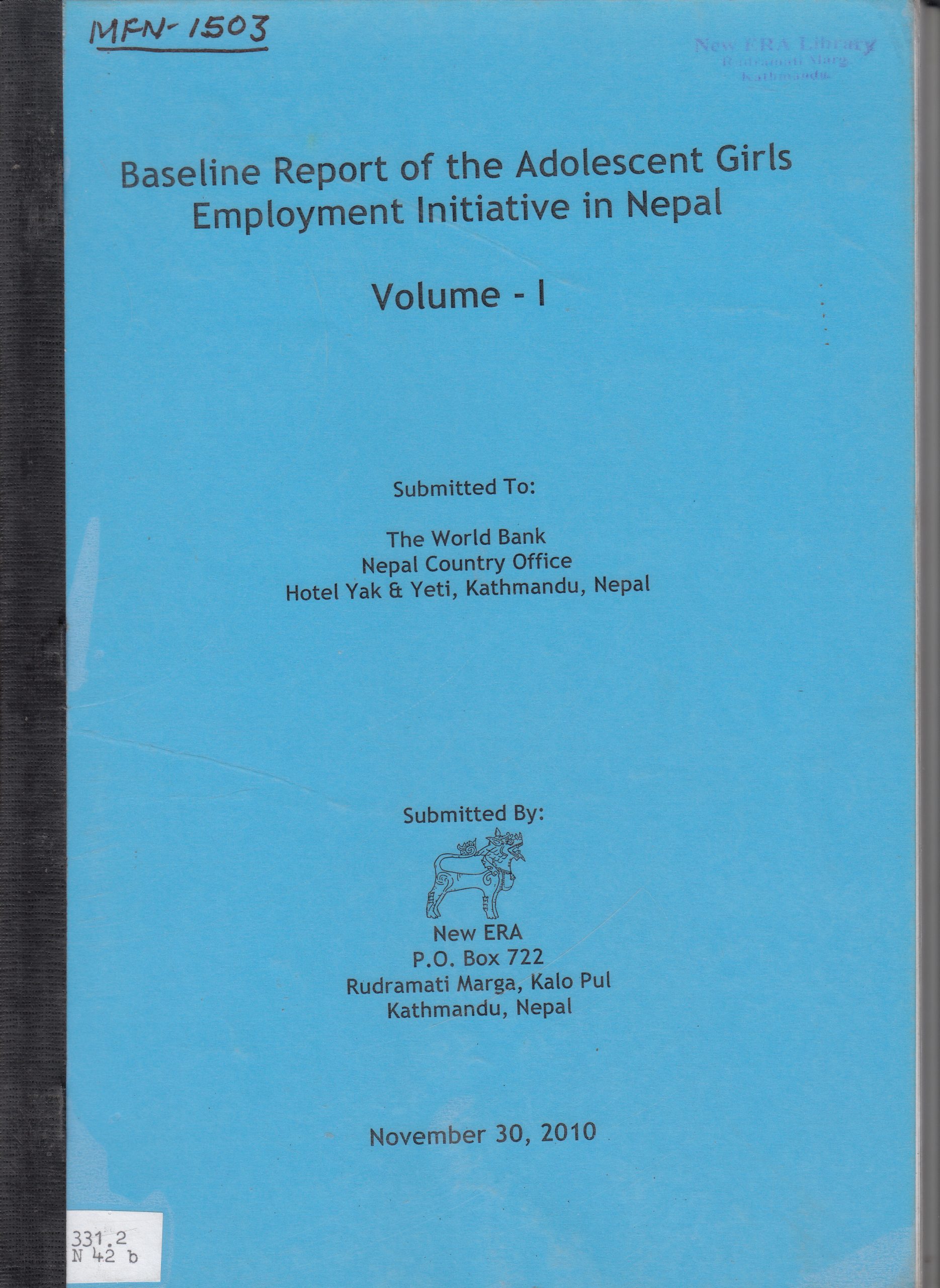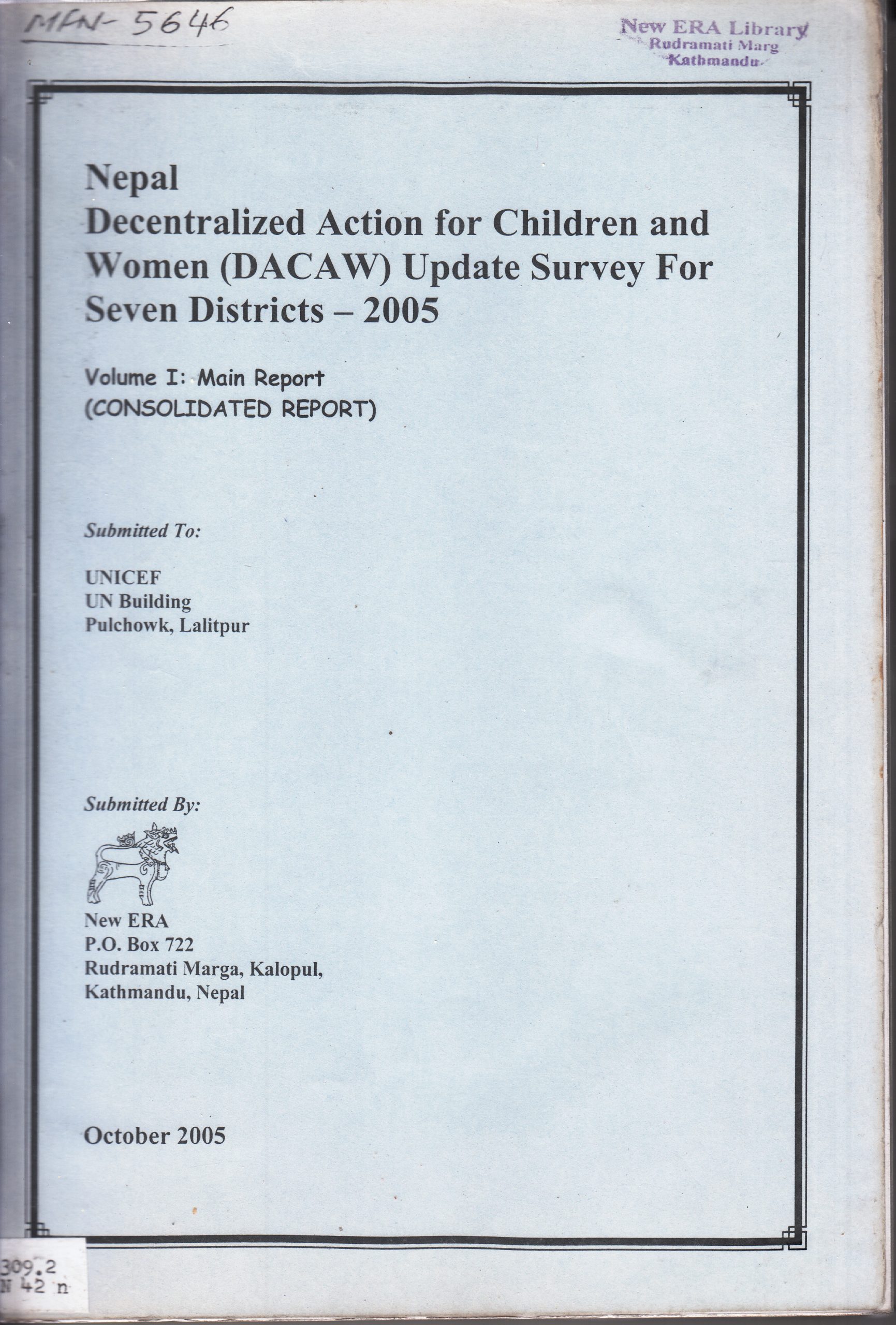This paper examines the impact of natal home property on women’s household decision making power and fertility behavior. The study attempts to answer whether land ownership of the natal family has influence on the empowerment of women, and thus the decisions made by the households.
Report Type: Gender
Adolescent Girls Employment Initiative in Nepal – First Follow Up Survey 2013
The Adolescent Girls Employment Initiative (AGEI) project is the World Bank led program in partnership with the Nike Foundation and the governments of Sweden, Norway, the United Kingdom, and Denmark in five low-income and post conflict countries (Afghanistan, Liberia, Nepal, Rwanda, and South Sudan) from year 2008. This initiative was to promote the economic empowerment of adolescent girls and young women by offering training and mentorship to facilitate young women’s transition to work and sustainable increase women’s participation in economic activities. In Nepal, Helvitas, an international NGO which serves as the Employment Fund Secretariat (EFS), has been executing skills training and employment program in different parts of the country. New ERA, being a national independent research organization, has served a series of surveys of AGEI Nepal. Those surveys are: Baseline survey 2010, AGEI 2011 Baseline, and Midline Survey, AGEI 2012 Baseline; Mid-line and Second Follow-up Survey, and AGEI 2013 First Follow-up Survey. The baseline surveys used to benchmark status before the program intervention and the endline surveys was to compare the post intervention performance indicators. The study assessed the indicator on education, gender empowerment, risk taking behaviors, remittance and household income, food behavior, risk behaviors and participation in skill development training. The study also assesses perception of household head on satisfaction with various aspects of their lives such as education, job or profession, dwelling, income and overall satisfaction with their life.
WFP New Country Program (2013-2017) -Baseline Survey
A five-year new country program 2013-2017 of World Food Program (WFP) is implementing in collaboration with the consortium of partners to enhance the resilience of vulnerable communities prone to shocks, and foster the food security and nutrition of vulnerable populations in Nepal. This survey was designed to obtain the baseline data on food security, disaster risk reduction, vulnerability, nutrition, school enrollment and attendance at the district level. The study assesses nutritional impact and anemia among women and children, child feeding behaviors among women; monthly income and expenditure; drinking water in local primary schools; and community awareness on health and nutrition.
Second Follow-Up Study of the Adolescent Girls Employment Initiative, Nepal 2012
This second follow-up of Adolescent Girls Employment Initiative (AGEI) Survey 2012 was designed to compare the pre and post intervention performance in the treatment and control groups in comparison with the First Follow-up Survey 2011 and 2010 Baseline Survey. The study determined the trend of various indicators in the last three surveys Baseline, first follow-up and second follow-up survey. The study assesses data on demographic, social and economic characteristics; gender empowerment; entrepreneurship, income and expenditure, HIV/AIDS awareness and risk taking behaviors.
Midline Survey for the Adolescent Girls Employment Initiative, Nepal 2012
This Midline Survey 2012 of Adolescent Girls Employment Initiative (AGEI) Program was designed to compare data on post-intervention performance indicators collected during the 2011 Baseline Survey and highlights any difference or trends across indicators between treatment and control groups in the two survey periods. The study assesses the indicators on education status, participation in skill development training, gender empowerment, risk taking behaviors, remittance and household income, food behavior, risk behaviors and awareness on HIV/AIDS.
Baseline Survey for the Adolescent Girls Employment Initiative, Nepal 2012
The principle objective of this Baseline 2012 survey of AGEI was designed to establish benchmark characteristics of survey respondents of the AGEI program on key socio-economic indicators. The study assesses data on demographic, social and economic characteristics of household and individual adolescents; gender empowerment; entrepreneurship, HIV/AIDS awareness and risk taking behaviors.
Baseline Survey of the Adolescent Girls Employment Initiative (AGEI) in Nepal 2011
This Baseline Survey of AGEI 2011 was designed to establish benchmark characteristics of individuals and households of trainees of 2011. The study assesses education status, income generating activities, migration, entrepreneurship knowledge and risky behaviors, demographic and socio-economic characteristics of individuals and their respective households. The study also assesses household income and expenditure, assets ownership, food security status, gender empowerment, alcohol consumption, and health and hygiene awareness among respondents. The study compared pre and post intervention performance on different indicators in the treatment and control groups.
Midline Survey of the Adolescent Girls Employment Initiative (AGEI) in Nepal 2011
This study was to provide follow-up information on individuals and households characteristics that were surveyed for AGEI Baseline 2010. The information on demographic, social and economic characteristics of individuals and their household was collected by tracking the same individuals and households those were sampled during the Baseline. The data on migration status of household members, education, remittance, gender perceptions on empowerment, income and expenditures, awareness about health and hygiene were collected among men and women age of 16-35 years who participated in training. The survey has compared different indicators of performance for treatment and control groups.
Baseline Survey of the Adolescent Girls Employment Initiative in Nepal
The Adolescent Girls Employment Initiative (AGEI) program was launched by World Bank with support of Nike Foundation, the government of Sweden, Norway and the United Kingdom and Denmark to uplift the economic empowerment of adolescent girls and young women in five low-income and post conflict countries (Afghanistan, Liberia, Nepal, Rwanda, and South Sudan). The objectives of the projects was to offer training and mentorship to facilitate young women’s transition to work and share a number of common characteristics, including modest budgets, designs to sustainable increase women’s economic participation in the country. This survey was to obtain baseline indicator at the individual and household level comparing the young adolescents participating in the treatment and those in the control group. The study was collected the information on demographic, social and economic characteristics of individual adolescents and household, education status, income and expenditure, financial knowledge, knowledge of entrepreneurship, gender empowerment, risk taking behaviors, and health and hygiene awareness among the respondents.
Nepal Decentralized Action for Children and Women (DACAW) Update Survey for Seven Districts 2005 – Consolidated Report
Decentralized Action for Child and Women (DACAW) program was officially started as Decentralized Planning for the Child Programme (DPCP) in 1998. The program was focuses on child health, maternal and neonatal health, safe drinking water and sanitation, basic education, protection of children and women, awareness of HIV/AIDS and so on. The key strategies followed for this include recurrent application of Community Action Process (CAP), improvement in responsive service delivery and promotion of decentralized governance in favor of children, mothers and caretakers. This survey was conducted to assess the changes of status of women and children in the program districts between 1998 and 2003. The study also examined the CAP settlements in relation to both responsive service delivery and decentralized governance.



